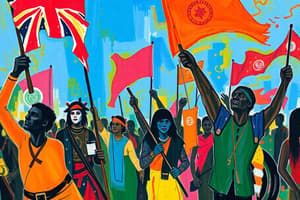Podcast
Questions and Answers
What was the primary goal of the Indian National Congress when it was founded in 1885?
What was the primary goal of the Indian National Congress when it was founded in 1885?
- To promote armed resistance against British rule
- To establish a complete independence from foreign influence
- To divide India based on religious lines
- To gain a greater share in government for educated Indians (correct)
Which event was a direct reaction to the Partition of Bengal in 1905?
Which event was a direct reaction to the Partition of Bengal in 1905?
- Swadeshi Movement (correct)
- Civil Disobedience Movement
- Ghadar Movement
- Quit India Movement
What was one of the outcomes of the Montagu-Chelmsford Reforms of 1919?
What was one of the outcomes of the Montagu-Chelmsford Reforms of 1919?
- Complete independence for India
- Introduction of limited self-governance (correct)
- Formation of the Muslim League
- Establishment of a British military rule
Which movement, led by Mahatma Gandhi, aimed to resist British rule through non-violent means?
Which movement, led by Mahatma Gandhi, aimed to resist British rule through non-violent means?
What was the significance of the Jallianwala Bagh Massacre in 1919?
What was the significance of the Jallianwala Bagh Massacre in 1919?
What was the main aim of the Quit India Movement launched in 1942?
What was the main aim of the Quit India Movement launched in 1942?
Which leader of the Indian National Congress envisioned a secular and democratic India?
Which leader of the Indian National Congress envisioned a secular and democratic India?
What role did the Ghadar Movement play in the context of Indian nationalism?
What role did the Ghadar Movement play in the context of Indian nationalism?
Flashcards are hidden until you start studying
Study Notes
Nationalism in India
-
Definition of Nationalism: A political ideology emphasizing the interests of a particular nation, often in opposition to foreign influence or control.
-
Historical Context:
- Late 19th century: Rise of nationalist sentiments due to British colonial policies.
- Economic exploitation, social reforms, and political oppression fueled discontent.
-
Key Events:
-
Indian National Congress (INC):
- Founded in 1885.
- Initially aimed at obtaining a greater share in government for educated Indians.
-
Partition of Bengal (1905):
- British decision to divide Bengal for administrative purposes.
- Seen as a strategy to weaken nationalist movements by creating religious divisions.
-
Swadeshi Movement (1905):
- Reaction against the partition.
- Promoted the use of Indian-made goods and boycott of British products.
-
Ghadar Movement (1914-1915):
- Aimed to overthrow British rule through armed struggle.
- Involved Indian immigrants in North America.
-
Montagu-Chelmsford Reforms (1919):
- Introduced limited self-governance in India.
- Led to greater demands for independence.
-
Jallianwala Bagh Massacre (1919):
- British troops killed hundreds of unarmed Indian civilians.
- Sparked widespread outrage and galvanized nationalistic feelings.
-
Non-Cooperation Movement (1920-1922):
- Led by Mahatma Gandhi.
- Aimed to resist British rule through non-violent means and non-participation.
-
Civil Disobedience Movement (1930-1934):
- Gandhi's Salt March in 1930 challenged British salt laws.
- Encouraged mass participation in civil disobedience.
-
Quit India Movement (1942):
- Launched during World War II demanding an end to British rule.
- Met with severe repression; widespread protests ensued.
-
-
Influential Figures:
- Mahatma Gandhi: Promoted non-violent resistance and civil disobedience.
- Jawaharlal Nehru: Key leader of the INC; envisioned a secular, democratic India.
- Subhas Chandra Bose: Advocated for armed struggle against British rule.
-
Impact of Nationalism:
- Fostered a sense of unity among diverse Indian communities.
- Led to increased political consciousness and participation among the masses.
- Ultimately contributed to India's independence in 1947.
-
Legacy of Nationalism:
- Nationalism played a crucial role in shaping modern India.
- Continues to influence Indian politics and identity today.
Definition of Nationalism
- Political ideology prioritizing the interests of a specific nation over foreign influence.
Historical Context
- Rise of nationalist sentiments in late 19th century driven by British colonial exploitation.
- Economic hardships, social reforms, and political oppression led to widespread discontent.
Key Events
-
Indian National Congress (INC):
- Founded in 1885 to advocate for increased political representation for educated Indians.
-
Partition of Bengal (1905):
- British division of Bengal aimed to weaken nationalist movements by exploiting religious divisions.
-
Swadeshi Movement (1905):
- Reaction against Bengal's partition promoting Indian-made goods and boycotting British products.
-
Ghadar Movement (1914-1915):
- Armed movement by Indian immigrants in North America seeking to overthrow British rule.
-
Montagu-Chelmsford Reforms (1919):
- Reforms introduced limited self-governance, escalating demands for full independence.
-
Jallianwala Bagh Massacre (1919):
- British forces killed hundreds of unarmed civilians, provoking national outrage and unity.
-
Non-Cooperation Movement (1920-1922):
- Led by Mahatma Gandhi, it involved non-violent resistance and withdrawing support for British rule.
-
Civil Disobedience Movement (1930-1934):
- Gandhi's Salt March in 1930 defied British salt laws, boosting public participation in civil disobedience.
-
Quit India Movement (1942):
- Launched amid WWII, demanding an end to British rule; met with severe repression and widespread protests.
Influential Figures
- Mahatma Gandhi: Advocated for non-violent resistance and civil disobedience.
- Jawaharlal Nehru: A leading INC figure envisioning a secular and democratic India.
- Subhas Chandra Bose: Championed armed resistance against British rule.
Impact of Nationalism
- Unified diverse Indian communities under a common cause.
- Increased political awareness and mobilization among the population.
- Led to India gaining independence in 1947.
Legacy of Nationalism
- Crucial in shaping contemporary India, significantly influencing political structures and national identity today.
Studying That Suits You
Use AI to generate personalized quizzes and flashcards to suit your learning preferences.




